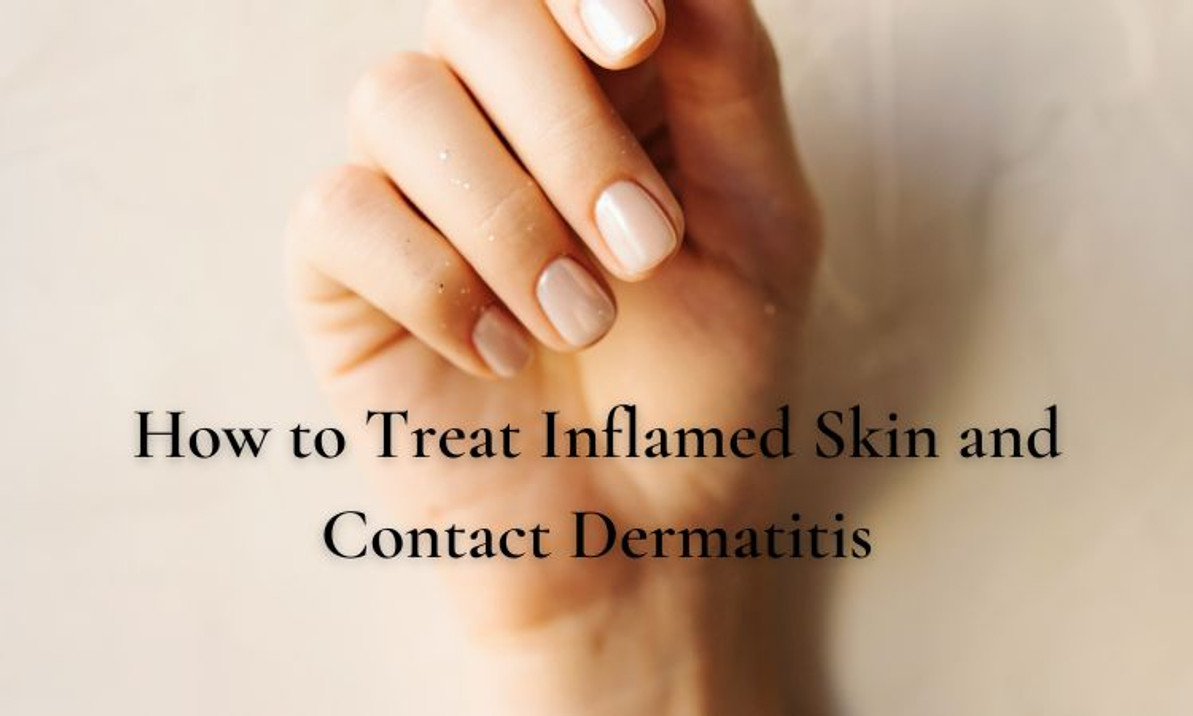How to Treat Inflamed Skin and Contact Dermatitis
Have you ever used a new skincare product or laundry detergent, only to notice your skin become red and irritated? You may have experienced contact dermatitis. This skin condition occurs when chemicals you come into contact with cause a reaction (usually unpleasant). Most cases of contact dermatitis reactions aren’t severe, but they can be uncomfortable until all the itching from contact stops.

What are the symptoms of contact dermatitis?
Contact dermatitis symptoms depend on the culprit and your sensitivity to the particular substance that caused the reaction. There are two main types of dermatitis, and the symptoms are:
Allergic contact dermatitis symptoms:
- dry, scaly, flaky
- hives
- blisters
- redness
- darkened or leathery
- burning sensation
- itching
- sun sensitivity
- swelling in the eyes, face, or groin

Irritant contact dermatitis symptoms:
- blistering
- cracking
- swelling
- skin that feels stiff or tight
- ulcerations
- open sores that form crusts
What causes contact dermatitis?
There are three types of contact dermatitis:
- allergic contact dermatitis
- irritant contact dermatitis
- photo contact dermatitis
Photo contact dermatitis is less common and can occur when the active ingredients in a skincare product are exposed to the sun, resulting in irritation.

What causes allergic contact dermatitis?
Allergic contact dermatitis happens when the skin develops an allergic reaction when exposed to a foreign substance (metals, plastics, fragrances), causing the body to release inflammatory chemicals that make the skin feel itchy. Common causes of allergic contact dermatitis include:
- jewelry (nickel or gold)
- latex
- perfumes or fragrances in products
- poison oak or poison ivy
What causes irritant contact dermatitis?
Irritant contact dermatitis is the most known type of contact dermatitis and happens when the skin comes in contact with toxic material. Toxic materials that can cause irritant contact dermatitis:
- battery acid
- bleach
- drain cleaners
- kerosene
- detergents
- pepper spray
Irritant contact dermatitis can also happen when the skin comes in contact with less irritating materials like soap or water too often. For example, anyone whose hands are frequently exposed to water, such as hairdressers, bartenders, and healthcare workers, often experiences irritant contact dermatitis.

How to treat contact dermatitis
Most cases of contact dermatitis go away once the substance is no longer in contact with the skin. Here are some things you can try at home:
- Avoid scratching your irritated skin. Scratching can worsen the irritation or even cause a skin infection that requires antibiotics.
- Wash your skin with calming soap and lukewarm water to help remove irritants.
- Quit using any products that might cause a problem.
- Use plain petroleum jelly to soothe the skin.
- Use anti-itch treatments like calamine lotion or hydrocortisone cream.
- Take an antihistamine like diphenhydramine to reduce itching and your allergic response.
You can buy these items almost anywhere, and most times, contact dermatitis isn’t a huge concern. However, you should seek a medical professional if your reaction (or irritated area) is severe and close to your eyes, or mouth, covers a large area of your body, or doesn’t improve with at-home treatment because your doctor can prescribe a more potent steroid cream.
Recent Posts
-
The Power of Exosomes in Skincare
Exosomes in Skin Care: The Future of Exosome and Regenerative Medicine in Skin Science Skincare inn …Oct 17th 2025 -
Steps for a Skincare Routine
6 Steps to a Proper Skin Care Routine: Your Esthetician-Approved Guide to The Best Skin If you've ev …Aug 11th 2025 -
Treatment of Hyperpigmentation
How to Treat the Appearance of Hyperpigmentation This Summer: Your Complete Guide Summer sun is wond …Jul 17th 2025




